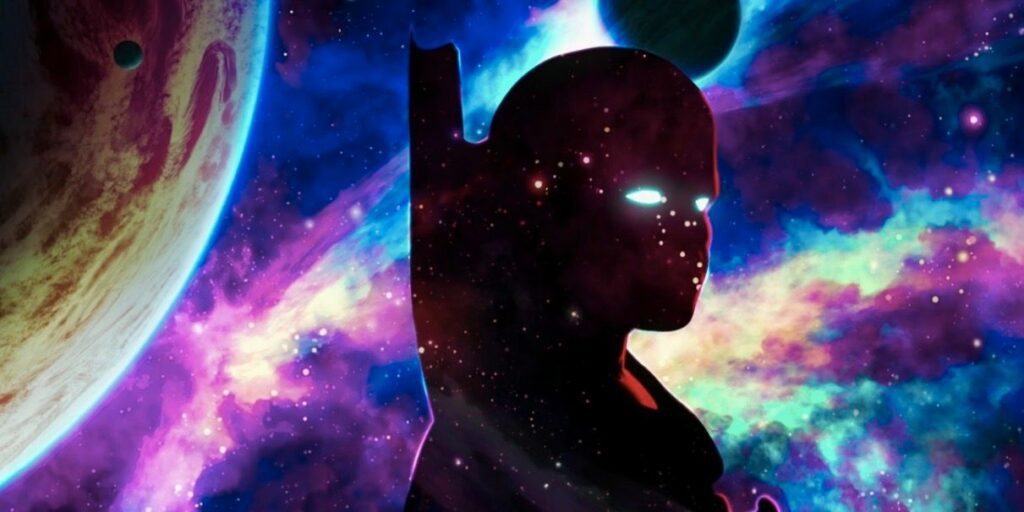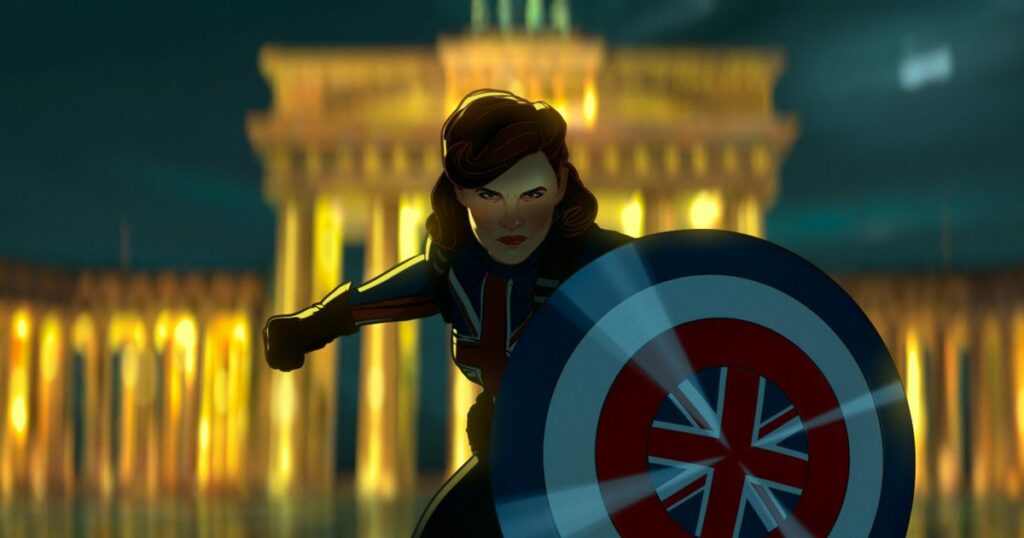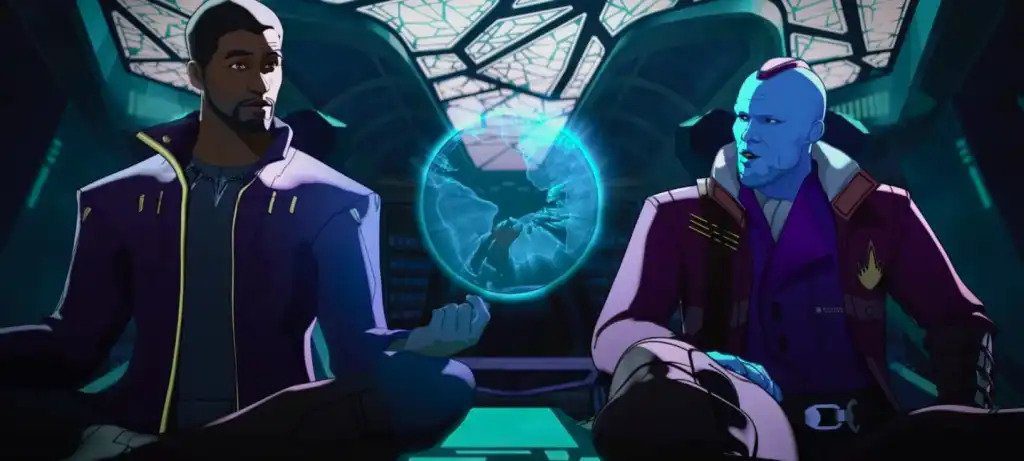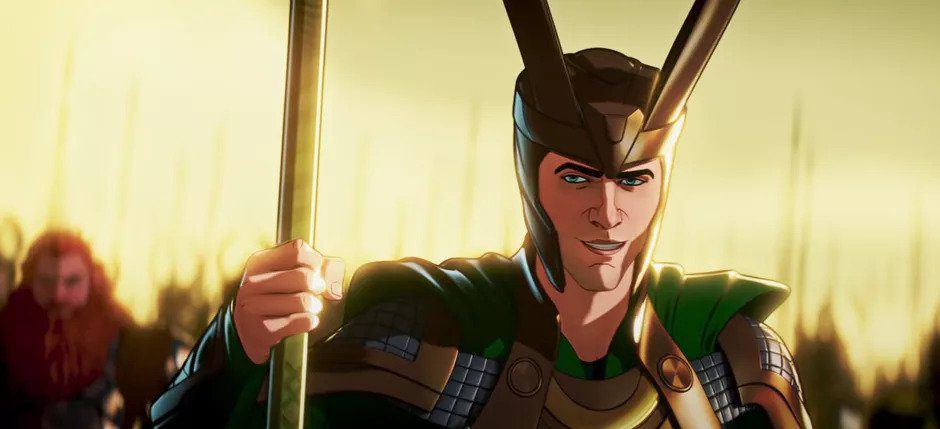In a new weekly column called Beyond the Screen, author A. J. Black unpacks what we’re all discussing from the world of cinema and television. This time, he looks at the imminent arrival of Marvel’s What If…? and how it operates on more than one level…
Marvel and animation have a long history going back decades. How many of us fondly remember the X-Men or Spider-Man animated shows from the 1990s, for example? Animation has always been, even before the live action Cinematic Universe, the logical extension of the comic-book written medium for this company.
What If…? marks a change, however, in the animated strategy. As the first non-live action series that is canon within the MCU, it holds a greater importance to the ongoing tapestry Marvel is weaving while having the strength to exist, on its own terms, as an anthology series in the classical sense of the word, harking all the way back to The Twilight Zone. Indeed, the very concept—The Watcher, a cosmic being observing the ‘multiverse’, determined never to interfere in the course of events, serves as our window into a legion of different universes that spin familiar Marvel stories in new directions—presents itself in the vein of such a series, with Jeffrey Wright’s Watcher in the Rod Serling role, introducing us in a deliberately enigmatic and lyrical way to the events we then watch unfold.

With clear inspirations, What If…? has the space, as a result, to bring a familiar style and tone to a vibrant and varied series that is currently defining our popular culture, in cinematic terms, for better or worse.
Head writer A. C. Bradley and chief director Bryan Andrews, who worked in turn with Marvel super producer Kevin Feige and a staff of writers to develop the series, as always with Marvel had source material to work from. What If…? began as a comic in the late 1970s with concepts such as “What If… Spider-Man joined the Fantastic Four?” or “What If… the Hulk had the mind of Bruce Banner?”; deliberate twists or inversions on characters and tropes we understood to be critical to who these characters and their situations were, allowing the comics to play around with our expectations. They were relatively throwaway stories but they were popular with readers and have had consistent runs across the decades since, growing increasingly dense within the mythology of Marvel as time passes.
The arrival of What If…? on screen is not coincidental when looked at broadly in terms of the MCU. Loki, after some foreshadowing in Avengers: Endgame, Spider-Man: Far From Home and WandaVision, has fully introduced the idea of the ‘multiverse’ to a universe built, in terms of lore, on the idea of parallel worlds across 60 years of storytelling. The first ten plus years of the MCU could well, in hindsight, be considered a run up to tackling the multiverse and placing stories within an array of alternate continuities and universes. The tapestry is enormous and looks set, through the primary live action series, to play a complicated part in the years to come.
In that sense, What If…? is placed as a conceptual introduction to an idea that will need streamlining, with very clear central story ideas: What if Peggy Carter ended up getting Steve Rogers’ super serum in WW2 and there was no Captain America? What if Yondu abducted T’Challa as a child and not Peter Quill and he became Star Lord instead? They are loglines we can understand, as an audience, as we grapple with the idea that Marvel is a universe built on multitudes.

Parallel worlds are nothing new in fiction, of course, and audiences will have an awareness of how these kind of narratives work going into What If…? Examples such as Sliders in the 1990s saw characters travelling between parallel versions of the world they knew, while Fringe’s entire mythology revolved around an alternate universe plotting dark deeds—an idea Loki more than liberally borrows from with the backstory doled out in the final episode of its first season; moreover the same idea was later given a ‘grown up’, Cold War-style spin in the sadly short lived Counterpart.
Audiences will grasp the idea of parallel worlds but the multiverse itself is slightly different and comic book adaptations to screen have only begun, in recent years, to explore this. DC have, with their successful ‘Arrowverse’ TV series, depicted ‘crisis’ events with alternate versions of the same characters, and their big screen The Flash movie currently filming looks set to be repeating the trick with more than one historical Batman gracing the narrative. Multiverses are about to become ubiquitous and What If…? has been designed as a clear, relevant introduction to the broader idea.
Bradley, Andrews and the team have, thankfully, pulled the adaptation off with real care and grace. Wright’s Watcher unintrusively anchors proceedings with requisite gravitas, giving audiences a way into the narrative without the need for backstory or exposition, and sets the thematic tone. Telling their tales in just over half an hour in live action terms could feel tight, compressed and problematic, but for animation it works wonders. The stories are allowed to flow swiftly without outstaying their welcome and at the same time have the space for beats of character along the way.
These being Marvel legends we know and love, What If…? is free of the laborious need for backstory. It assumes audiences have seen Captain America: The First Avenger or Guardians of the Galaxy and is free to play with scenes or moments or characters we have come to adore over many years and subvert our expectations. In the second episode, there is a twist on one particular infamous MCU villain that is simply joyous, and incredibly will leave you wishing you could see more of the character in that guise.

What If…? therefore is operating on two different levels. From a narrative perspective, it is expressly establishing the multiverse concept for the live action, and any subsequent canonical animated series, to play with and likely subvert or implode. We can only enjoy the fallout if we understand the rules of the multiverse first. While from an audience expectation perspective, What If…? satisfies a need for familiarity and indeed nostalgia at a point the MCU is crossing a boundary. Many of the characters featured in the first few episodes of What If…? are now either dead or have moved on from the overarching story, certainly in the manner we became familiar with them.
Marvel is about to debut a number of new characters on the big and small screen in the coming year—Shang-Chi, Eternals, She-Hulk, and Ms Marvel to name but a few—with the intention of building on the remaining older retinue of characters and forging an entirely new roster of heroes for audiences to enjoy, but introductions and origin stories are always a bigger gamble than sequels or continuing narratives.
By producing What If…? now, Marvel gets to have its cake and eat it. We can enjoy T’Challa or Black Widow or Peggy Carter etc…through inversions of how we knew them, and came to love them, voiced for the most part by the original actors—with the added poignancy of hearing the late Chadwick Boseman’s voice once again in T’Challa’s instance—though there are some notable and curious omissions, one of which will come as little surprise given recent lawsuit reports regarding Disney. While at the same time What If…? can lay track for just how the MCU is going to rapidly and significantly change in the next few years.
Comic book readers will understand that teams such as Avengers or X-Men, etc., change and morph, come and go, but traditional movie or TV audiences have never experienced this before. If Marvel can successfully deliver, one day, a new Avengers movie with an entirely different cast, the experiment will be successful, but to achieve that products like What If…? will be essential. Marvel will struggle to engage audiences with entirely new characters and content to slowly fall for without balancing it with the older, established faces and storylines audiences fell in love with initially.

What If…? will help bridge that gap. The voice work is largely excellent, the animation is frequently truly superb—allowing Marvel to pull off set pieces with our familiar heroes and villains that the live action projects might struggle to do—and the chosen stories are both accessible and diverse (Episode 1 is classic hero fare, Episode 2 has elements of heist, Episode 3 is structured as a mystery). It is, quite simply, the kind of rewarding, well-produced joy that any fan of Marvel’s recent content is going to lap up with glee, even if it might be considered more disposable and have less dramatic resonance than some of the live action projects.
That is perhaps, in some way, to be expected. Nor should it be a problem or a barrier. It truly is a product for established audiences more than new ones and, while it is easy to sniff at nostalgia and the corporate repetitive mining of IP, when it is approached with the attention to detail, love and care What If…? demonstrates, we are reminded of why we return to worlds and characters we love.
Now, those worlds and characters through What If…? and beyond, are about to get a whole lot bigger.

